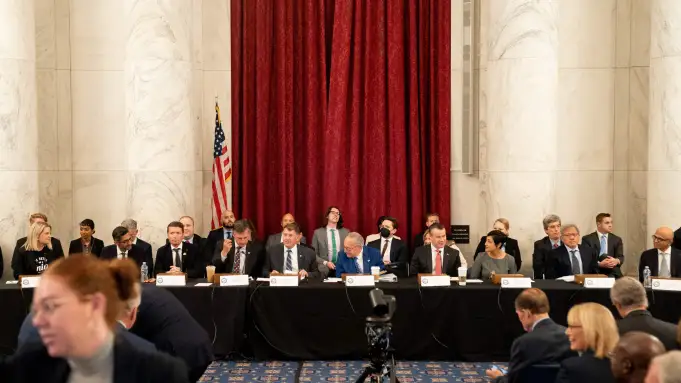The Senate’s First-of-its-Kind AI Forum
In a novel effort to grapple with the implications of artificial intelligence, Senate Majority Leader Chuck Schumer recently spearheaded a closed-door forum on AI. The star-studded panel featured Silicon Valley luminaries such as Elon Musk, Mark Zuckerberg, and Bill Gates, as well as academics and ethicists. For six hours, these tech moguls and experts held the microphone, while elected senators were relegated to the role of silent observers.
A notice from Schumer indicated that senators wouldn’t have the opportunity to ask questions or offer remarks during this pivotal discussion. Yet, this decision is seen by many as problematic, particularly because it ignores the elephant in the room: the trust issues plaguing Congress itself.
As generative AI technologies are becoming increasingly adept at churning out convincing misinformation and disinformation, experts contend that the Senate should focus on restoring its own credibility. Dan Mintz, chair of the Department of Information Technology at the University of Maryland Global Campus, articulates this sentiment, stating, “If people don’t believe in the process, they won’t believe in the result.”

Reality Versus AI: The Deteriorating Trust in Facts and Institutions
Today, facts seem to be an archaic concept that’s slowly fading away. In the digital era, the line between myth and reality has been blurred, thanks in part to generative AI technologies. These sophisticated algorithms are enabling politicians to craft persuasive narratives that appeal to voter biases. Such advancements in AI are setting the stage for even darker manipulations on our social media feeds.
Despite the transformation of the information landscape, lawmakers appear to be cautiously optimistic about tech interventions. For instance, Google’s recent decision to require the disclosure of synthetic, AI-generated content in political ads has been praised by many politicians. Michigan Senator Gary Peters notes, “We have to have a way for folks to easily verify that what they’re seeing is reality.”
However, is technology genuinely equipped to restore faith in American political institutions? The answer seems elusive, as ideological polarization continues to grow. Current data suggests that a significant proportion of Republicans and Democrats harbor mistrust in the media, and also believe in false narratives about the 2020 presidential election.
Deepfakes, Political Disinformation, and Technological Band-Aids
In a landscape rife with mistrust, some lawmakers and experts argue that AI can help by watermarking AI-generated content. But is this really more than just a superficial fix? According to Chinmayi Arun, Executive Director of the Information Society Project at Yale Law School, it won’t solve the fundamental issues at hand. “We need a rebuilding of trust,” she says.
Senator J.D. Vance, an Ohio Republican, adopts a different perspective, stating that a general level of skepticism may eventually become beneficial. In his view, people might begin to disbelieve everything they encounter online, although he admits that this could initially result in disruptions.
The Politicization of Artificial Intelligence: Policy Divides and Regulatory Challenges
During this summer, Schumer and a bipartisan coalition led three confidential briefings focused on AI. These sessions aimed to inform senators about AI’s potential implications and policy challenges. However, despite the bipartisan nature of these discussions, there’s a chasm between Democrats and Republicans when it comes to implementing new regulations.
While Democrats push for new AI agencies and stricter guidelines, Republicans argue that existing laws can be adapted to an AI-enabled world. The partisan divide makes it increasingly likely that future presidents will appoint an “AI czar” within their administration—a move that would sidestep the need for Senate approval.
The Unsettling Economics of Generative AI
As Silicon Valley giants are raking in substantial profits from their AI endeavors, government funding lags dramatically behind. Siwei Lyu, a professor at SUNY University at Buffalo, observes that this glaring disparity demands government intervention and investment. Unfortunately, Congress seems more inclined to give these financially robust CEOs a platform rather than invest in counter-technologies.
The Unaddressed Issue: The Infiltration of AI into Politics-as-Usual
Finally, as senators brace themselves to listen to discussions on AI, what remains unspoken is the technology’s potential to shape our reality according to hyper-partisan views. Despite the ongoing conversations and debates, AI continues to disrupt various sectors without significantly altering the stagnant political landscape in Washington, D.C.
The situation highlights the urgent need for policy solutions that not only address the advancement of AI technologies but also work towards rebuilding trust in our democratic institutions. If left unaddressed, generative AI’s capabilities risk amplifying the already fragmented and deeply polarized American political system.



